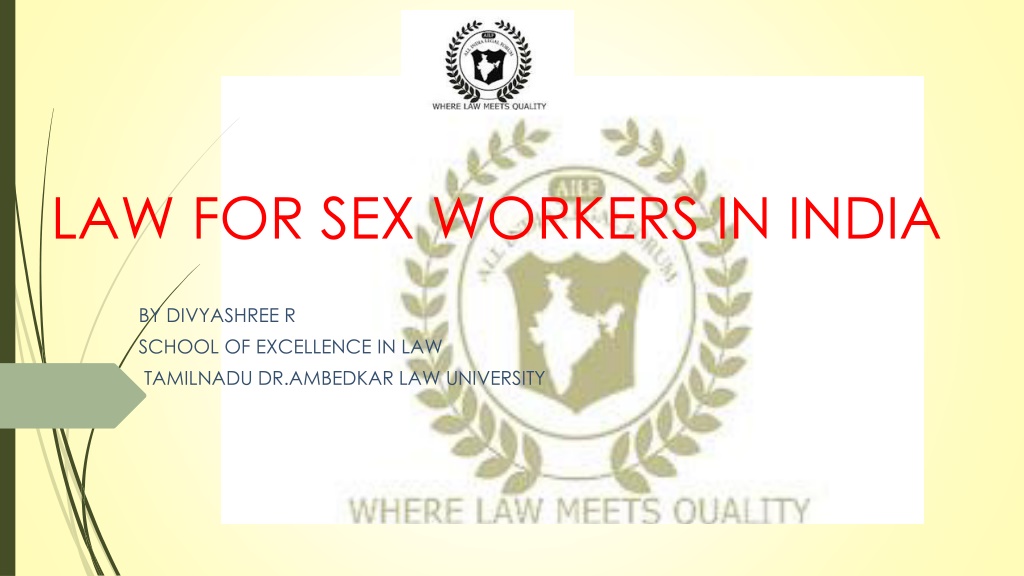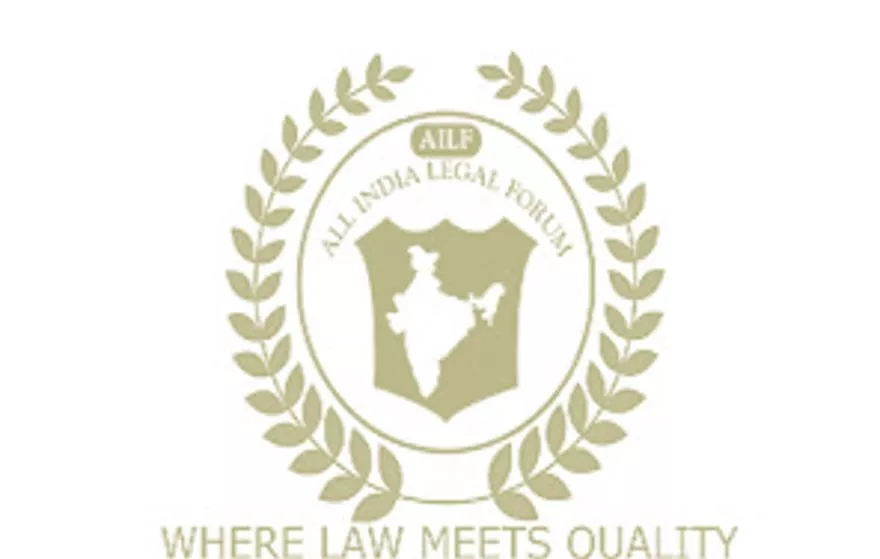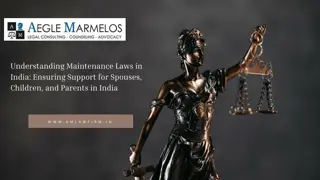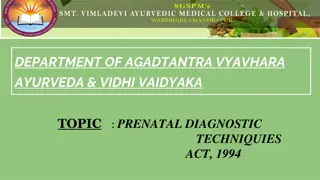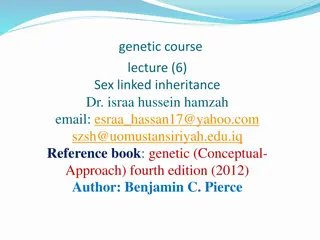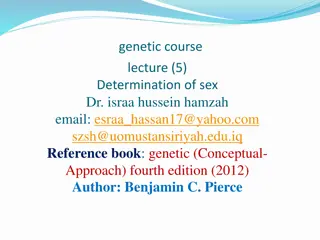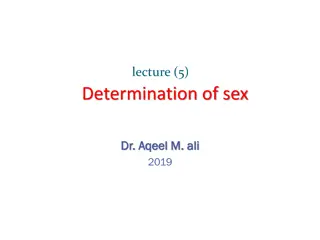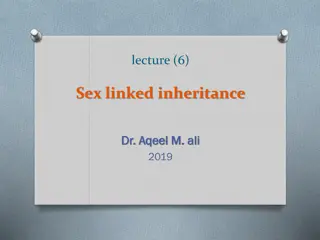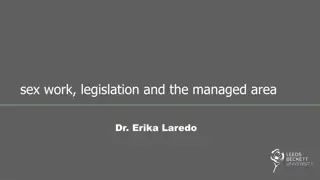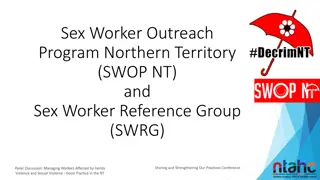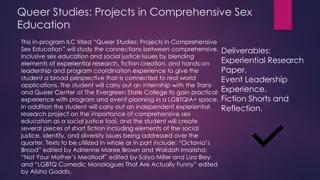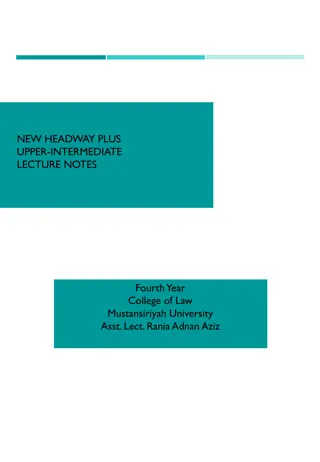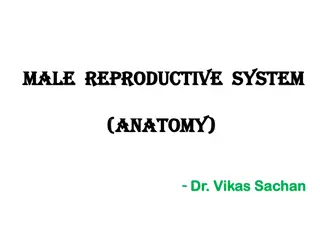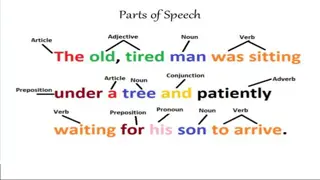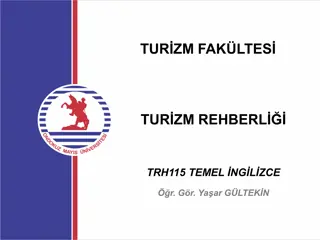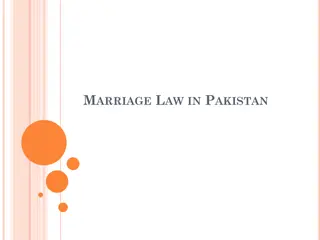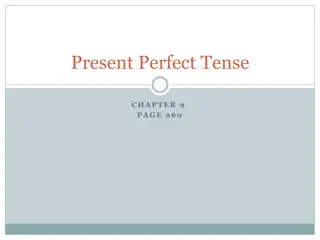Sex Work Laws in India: Past, Present, and Perspectives
Prostitution in India has a complex history, from early colonial times to present-day legal ambiguities. This article explores the definitions, causes, and legal status of prostitution in India, shedding light on related professions and activities punishable under law.
Download Presentation

Please find below an Image/Link to download the presentation.
The content on the website is provided AS IS for your information and personal use only. It may not be sold, licensed, or shared on other websites without obtaining consent from the author.If you encounter any issues during the download, it is possible that the publisher has removed the file from their server.
You are allowed to download the files provided on this website for personal or commercial use, subject to the condition that they are used lawfully. All files are the property of their respective owners.
The content on the website is provided AS IS for your information and personal use only. It may not be sold, licensed, or shared on other websites without obtaining consent from the author.
E N D
Presentation Transcript
LAW FOR SEX WORKERS IN INDIA BY DIVYASHREE R SCHOOL OF EXCELLENCE IN LAW TAMILNADU DR.AMBEDKAR LAW UNIVERSITY
What is prostitution? Prostitution can be said to be the sexual interaction with the other for earning money from it. According to sec 2(f) of the Immoral Traffic (Prevention) Act, 1956 prostitution is defined as : prostitution means the sexual exploitation or abuse of persons for commercial purpose, and the expression prostitute shall be construed accordingly;
PROSTITUTION IN INDIA- EARLY STAGES When Goa was a portugeese colony , women and girls were brought and captured women and girls from Japan as sexual slaves. The red-light districts of cities such as Mumbai developed British East India Company in the late 18th and early 19th centuries established and maintained brothels for its troops across India. The Cantonment Acts regulated and structured prostitution in the British military bases which provided for about twelve to fifteen Indian women kept in brothels called chaklas for each regiment of thousand British soldiers.
PROFESSIONS RELATED TO PROSTITUTION IN INDIA Kasbi - a female belonging to family which practices hereditary sex trade over several generations Kanjari -low-class uncultured Tawaif ( master of arts, including singing and dancing) Other related often misunderstood but traditionally/originally non-prostitution professions Devdasi- temple dancer devoted to the practice of spiritual dancing. Domni-a hereditary female singer.
CAUSES OF PROSTITUTION Economic poverty Biological cause Inability to arrange marriage Lack of sex education Kidnapping and abduction Extreme drug and alcoholic usage
IS PROSTITUTION LEGAL? Even though people think prostitution is illegal act in india, as per the law prostitution itself is not mentioned as illegal in the Indian Penal Code or any other specific laws. But few other activities related to prostitution are considered as illegal as per The Immoral Traffic (Prevention) Act, 1956
ACTIVITIES RELATED TO PROSTITUTION PUNISHABLE UNDER LAWS Soliciting services of prostitution at public places Carrying out prostitution activities in hotels Being the owner of a brothel Pimping Indulge in prostitution by arranging a sex worker Arrangement of a sex act with a customer
continued Kerb crawling Child prostitution Indulging in prostitution within 200 yards of public places A male member living with a prostitute s money earned from sexual activities.
LAWS ABOUT PROSTITUTION The Immoral Traffic (Prevention) Act, 1956 deals with prostitution Article 23(1) of the Constitution prohibits traffic in human beings and beggars and other similar forms of forced labor. Article 23(2) declares that any contravention of this provision shall be an offense punishable in accordance with the law. In the case Raj Bahadur v. Legal Remembrancer it was noted that Traffic in human beings' means selling and buying men and women like goods and includes immoral traffic in women and children for immoral" or other purposes.
continued The State of Uttar Pradesh v Kaushalya- In this case, a number of prostitutes were required to be removed from their place of residence for maintaining decorum in the city of Kanpur. The High Court of Judicature at Allahabad contended that Section 20 of the Act abridged the fundamental rights of the respondents under Article 14 and sub-clause (d) and (e) of Article 19(1) of the Constitution. The Act was held to be constitutionally valid as there was an intelligible difference between a prostitute and a person causing a nuisance. Sec 20 : Removal of prostitute from any place.
SOLICITING Soliciting is the action or fact of accosting someone and offering one's or someone else's services as a prostitute. According to sec 8 of the Immoral Traffic (Prevention) Act, 1956 soliciting a person with sexual offers is illegal punishable on first conviction with imprisonment for a term which may extend to six months, or with fine which may extend to five hundred rupees, or with both, and in the event of a second or subsequent conviction, with imprisonment for a term which may extend to one year, and also with fine which may extend to five hundred rupees
BROTHEL Abrothel is a place where people engage in sexual activity with prostitutes where a number of prostitutes do their business Sec 3 of the Immoral Traffic (Prevention) Act, 1956 illegalizes brothel. Punishment for keeping a brothel - first conviction with rigorous imprisonment for a term of not less than one year and not more than three years ,fine which may extend to two thousand rupees and in the event of a second or subsequent conviction, with rigorous imprisonment for a term of not less than two years and not more than five years and also with fine which may extend to two thousand rupees.
continued Allowing premises to be used as a brothel- knowledge that the same or any part thereof is intended to be used as a brothel must be there punishable on first conviction with imprisonment for a term which may extend to two years and with fine which may extend to two thousand rupees and in the event of a second or subsequent conviction, with rigorous imprisonment for a term which may extend to five years and also with fine. Closure of brothel dealt with sec 18
PERSON LIVING IN THE EARNINGS OF A PROSTITUTE Sec 4 of the Immoral Traffic (Prevention) Act, 1956 illegalizes the above mentioned act. Any person over the age of eighteen years who knowingly lives, wholly or in part, on the earnings of the prostitution of any other person shall be punishable with imprisonment for a term which may extend to two years, or with fine which may extend to one thousand rupees, or with both . Sec 7 of the Immoral Traffic (Prevention) Act, 1956 illegalizes prostitution within 200 yards of public places.
CHILD PROSTITUTION Child prostitution is a forced prostitution where young children or teenagers are compelled into prostitution due to numerous factors. Indian Penal Code, 1860 penalizes child prostitution, namely selling and buying of minors for the purpose of prostitution. Sec 372 of the Code awards imprisonment of at least ten years for a person selling a minor for the purpose of prostitution. Sec 373 of the Code awards imprisonment of ten years for buying a minor person for the purpose of prostitution. Certain sections of Immoral Traffic (Prevention) Act, 1956 are also applicable.
CONCLUSION Protection houses must be established for those prostitutes who have lost their livelihood, or those who were forced into prostitution. Teach sex education to those people. Government should impart any practical knowledge in them to lead their livelihood.
